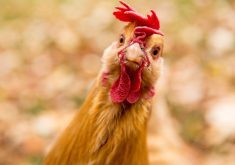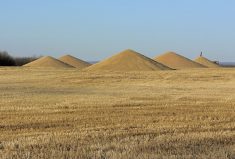In early November, I put on boots with the heaviest traction I could find, opened the door and attempted to strike out for a walk with the family dog.
Manitoba had just been blasted with an early shot of winter and, although it would all soon disappear, the entire landscape at the time was glazed in snow and a thick overcoat of ice.
After walking 100 metres and forcefully introducing my back to the gravel road at least once, I gave up.
Read Also

Spoken questions are what make it an interview
Recently, I was exchanging emails with the media email account at a government agency, hoping to reach a source for…
Just like me, fighting for balance on previously familiar and predictable ground, it feels like ag has also been fighting to regain equilibrium this year.
As reporter Jeff Melchior writes in our January 4, 2024 issue, the number of 4WD tractors moving off lots in the last few months has been head and shoulders above 2022. Some of those are new sales, but many are old orders that, after weeks and months of delays, are just now being delivered to farmers.
It’s taken this long to begin unravelling the Gordian knot that the pandemic and other stresses made of North America’s farm equipment supply chain. And, given how the ripples of that disruption absorbed the used market — Melchior quotes Greenvalley Equipment’s Kevin Kehler on the depleted state of used inventory — it’ll take longer yet to untangle.
Then there’s the shifting ground beneath the cattle sector. For the first time in a long while, beef producers have been feeling pretty good about prices. Manitoba was dry in 2023, but it wasn’t 2021-levels of dry, and compared to the conditions their fellow producers were fighting in southern Alberta, Manitoba’s sector could count its blessings.
But the industry is also still catching its breath after the sucker punches it took from the 2021 drought and, only months later, major spring snowstorms during the peak of the commercial calving season, followed by flooding.
Statistics Canada data shows that, as of July 1, 2023, Manitoba had 80,000 fewer cattle compared to the same time two years before. The beef hit was greater, but the total was offset by gains in dairy cattle. From July 1, 2021, to July 1, 2023, Manitoba’s beef herd contracted by 84,000 head, or about 8.3 per cent.
Meat sectors in general have been trying to keep their footing, as meat is one of the more expensive items in consumers’ grocery carts in an era of blood- in-the-water debate over food price inflation.
The recently released Canada Food Price Report 2024 forecasts relief on the inflation front, although less so for meat, vegetables or baked goods.
We also started the year reeling from the market and geopolitical chaos stemming from the Russian invasion of Ukraine.
Last January, speakers at Manitoba Ag Days highlighted the astronomical spikes seen in the fertilizer market in previous months, spikes that mellowed and stabilized through 2023. Producers dodged the full fallout thanks to dramatically high commodity prices.
Late this year, a Statistics Canada report on farm income showed that farm cash receipts in 2022 rose 15.2 per cent, but input price increases translated to a 7.7 per cent reduction in realized net income.
Interest rates, likewise, aren’t exactly in recovery mode, although entities like Farm Credit Canada expect things will ease in the coming year.
Coming into 2024 feels like me making the final trek back to the house door in November. There are signs the worst is over, but we’re still watching our footing.















